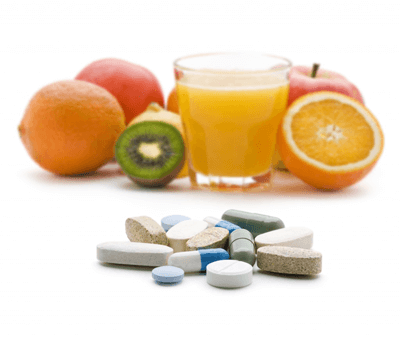The 5 most important vitamins and minerals for a more vital life!

Everyone knows that we need vitamins and minerals for good health.
But which nutritional supplements are essential for everyone and in what quantities do you need them to make you feel better?
According to the FIOW, dietary supplements belong in the growing sector of preventive self-care. They are primarily for healthy men and women who want to protect themselves against diseases.
Even weakened, non-sick people can improve their condition by making use of a correct selection of vitamins and minerals.
Finally, dietary supplements are also used to recover recovering patients more quickly.
During the treatment of an acute or chronic illness, nutritional supplements can only be used to reduce any side effects of medication and to improve the quality of life of the patient during his illness.
The latter can only be done if there are no interactions between the necessary medication and the food supplements.
Dietary supplements are not a miracle cure. They only work optimally if they are combined with healthy eating and drinking habits, sufficient exercise, sleep and a meaningful professional and / or private life.
- Calcium
Calcium is essential for a healthy body. In food it can be found in low-fat dairy products and in supplements. We need between 1200 to 1500 milligrams of calcium every day.
A classic glass of milk (1/4 liter), or a fruit juice fortified with calcium, contains about 300 milligrams of calcium. You need 4 to 5 such glasses per day to get the necessary dose of calcium. Check whether this is correct with your eating and drinking habits. Take a calcium supplement if you do not approach the specified amounts.
Calcium is needed to get strong bones and improve bone density. Calcium is vital for everyone but growing children and people with an increased risk of osteoporosis (bone loss) can certainly not do without a daily calcium supply of 1500 milligrams.
Calcium is stored in the muscle cells in certain cell organelles. If a nerve impulse from the brain is sent to a muscle, the calcium ions will come into action. As a result, the muscle is flexed. The mineral is indispensable for good heart function and it plays a role in the nerve impulse transfer.
Calcium also has a regulating effect on blood pressure and it is involved in blood clotting processes.
Properties of Calcium
Helps prevent osteoporosis and treat the symptoms in its early stages.
Used against high blood pressure.
Prevents heart problems.
Used against arthritis.
Keep the skin healthy.
Relieves muscle cramps in the legs.
Promotes a regular and powerful heartbeat.
Helps the body with iron metabolism.
Necessary for transmitting nerve impulses and muscle functions.
Symptoms in case of a shortage
Rickets
Osteoporosis
Weak bones and teeth
Leg cramps
Maximum dose
Doses above 2000 milligrams of calcium per day are not recommended. - Magnesium
Magnesium is also called the anti stress mineral. This mineral is an important nutrient for the brain. It increases resistance to stress, depression, tension and prevents mental fatigue.
Magnesium also strengthens memory and concentration. Furthermore, magnesium is involved in the release of energy from the diet and the proper functioning of the nervous system and muscles.
Most orthomolecular doctors agree on one thing. Magnesium is a basic supplement for everyone.
Officially, the daily dose for magnesium is set at 400 milligrams. Orthomolecular scientists and doctors have proof that we need at least the triple (1200 milligrams). This certainly applies to people with an increased risk of cardiovascular disease, people with muscle spasms and headaches.
More than 80% of the population has a magnesium deficiency because our agricultural land hardly contains magnesium. The cooking and preparation of food causes the magnesium residues to be lost. Finally, most medications ensure that magnesium still present in the body disappears through the urine.
Magnesium deficiency is particularly recognizable by the increasing incidence of asthma, diabetes, kidney disease and even migraine.
Magnesium is also important for calcium absorption in the body.
In 2006 it is almost impossible to include enough magnesium via the diet. The only possibility is quality supplements.
What happens in case of insufficient magnesium supply?
The magnesium content in the blood is very important for muscle function. A low level is accompanied by muscle spasms, reduced muscle condition, fatigue, moodiness, premenstrual complaints in women, irregular heartbeat, increased blood pressure, kidney stones and heart problems.
Properties of Magnesium
Helps prevent kidney and gall stones.
Used in the treatment of high blood pressure.
Useful in the treatment of prostate problems.
Necessary for many bodily functions including energy production and cell division.
Essential for transmitting nerve impulses.
Protects against cardiovascular diseases.
Helps with the treatment of PMS complaints.
Restores and maintains the body's cells.
Needed for the hormone system.
Helps in the treatment of 'restless legs'.
Symptoms in case of a shortage
Slack feeling
Fatigue
Nervous outbursts
Fickleness
Hyperactivity in children
Low blood sugar
Palpitations
Toxicity
Magnesium is only toxic to people with kidney problems or disorders in the stimulation conduction between the atrium and the heart chamber. - Vitamin C

Vitamin C is also known as L-ascorbic acid. It is one of the most important vitamins for the immune system.
Vitamin C is focused on growth and regeneration. It is also the cleaning vitamin par excellence. Vitamin C ensures the removal of breakdown products, of those things that the body no longer needs. You can also easily imagine that you feel much fitter without this 'ballast'.
This is how vitamin C also works on the emotional life of people. L-ascorbic acid therefore plays an important role in getting a positive outlook on life. A vitamin C deficiency causes more depression.
Symptoms in case of a shortage
Feeling of weakness
Fatigue
Bad healing wounds
Irritability
Bleeding gums, loose teeth
Easily bruise
Joint pain
Lack of appetite
Heart complaints
Therapeutic use
Antioxidant (powerful protection against free radicals)
Accelerates the healing of wounds.
Keep bones, teeth and genitals healthy.
Works as a natural antihistamine (in allergic reactions).
Can help to fight infertility in the man.
Reduces the duration of colds and other viral infections.
Promotes the immune system.
Good for heart and blood vessels.
Stimulates fat metabolism and detoxification.
Particularities
Vitamin C is not harmful even at high doses.
In very high quantities, some people suffer from diarrhea. This is seen as the bowel tolerance limit. The intestine does not take more vitamin C than necessary. The 'surplus' attracts moisture and causes diarrhea. The solution is simple: reduce the dose slightly or spread the intake more throughout the day.
Vitamin C is available as ascorbic acid, and as ascorbate complex.
Ascorbic acid is relatively cheap, but the acids affect the tooth enamel and can cause stomach complaints. A C ascorbate complex is pH neutral, spares the stomach and is generally better absorbed by the body.
Factors for increased use
Smoking (500 mg per cigarette), exposure to toxins (living in a city or industrial area), use of the pill, use of medicines, use of antibiotics, use of refined sugars, use of alcohol, stress and tension (both physically and mentally ).
Dosage
The orthomolecular dose is 3 grams per day. Therapeutic doses can be up to 20 grams per day.
Natural resources
L-ascorbic acid in a complex (together with other substances that neutralize the acids) is common in citrus fruits, broccoli, tomatoes, green vegetables and potatoes.
Ester C the best and safest form
Ester-C is more potent and long-lasting than regular vitamin C. It is a high-dose vitamin C that contains the Citrus Bioflavonoids that also occur in fresh fruits and vegetables. These strengthen the effect and absorption of vitamin C in the entire body.
Ester C is absorbed twice faster and better, does not cause any problems with digestion and leaves the tooth enamel unaffected. - The B vitamins

The vitamin B group - with special attention for vitamin B6, B12 and folate or folic acid - are basic ingredients for our total health.
In another article you can read how dangerous homocysteine is in the development of cardiovascular diseases. Homocysteine is at least as health threatening as an excess of cholesterol and triglycerides (blood fats) combined.
Homocysteine levels increase due to fast food, ready-to-eat meals, alcohol, coffee and other 'empty calorie drinks'. Vitamins from the B group are then of gold value to significantly reduce the homocysteine level (down to -30%).
The minimum doses for folic acid, vitamin B6 and B12 are 400 micrograms, 1.7 milligrams and 2.4 micrograms, respectively.
Vitamins from the B group can still be found in grains and bread that may or may not be fortified with added folate.
Vitamin B is also in fruits and vegetables. Think especially of spinach, broccoli and asparagus. Check your multivitamin leaflet for how much vitamin B-6 and B-12 it contains. Normally the minimum quantity has to be achieved.
Properties of vitamin B6, folic acid and vitamin B12
Vitamin B6 is water-soluble. Pyridoxine (B6) together with folic acid and vitamin B12 provides for the absorption of iron through the body and is involved in the formation of red blood cells.
These three vitamins also ensure proper functioning of the nervous system and play an important role in amino acid metabolism.
Folic acid stimulates the formation of gastric acid and is important for good liver function.
This B-vitamin is involved in the metabolism of proteins and fats, it is necessary in the formation of red blood cells (it prevents certain forms of anemia) and it helps the brain metabolism. Folic acid is also needed for the metabolism of DNA and RNA.
Folic acid is also indispensable in cell division processes of the body. Therefore, women who are or want to become pregnant are advised to use extra folic acid.
Vitamin B12 (cobalamin) together with vitamin B6 (pyridoxine) and B11 (folic acid) provides for the absorption of iron through the body and is involved in the formation of red blood cells.
A deficiency of these vitamins can lead to anemia. These three vitamins ensure a good functioning of the nervous system.
Why use B 6?
Increases the resistance.
Helps regulate diabetes.
Ensures the absorption of proteins and fats.
Relieves nausea.
Helps prevent skin and nerve disorders.
Treats symptoms of premenstrual syndrome (PMS) and menopause.
Reduces muscle pangs.
Works like a natural urinary agent.
Helps protect against cancer.
Why folic acid?
Improves milk separation.
Can help protect against cancer.
Improves the skin.
Is a natural painkiller.
Improves appetite.
Gives babies and children resistance to infections.
Is necessary in the production of DNA and RNA (the heredity molecules).
Helps prevent an open back.
Why take B 12?
Necessary for maintaining the nervous system.
Improves memory and concentration.
Needed to use fats, carbohydrates and proteins.
Gives more energy.
Promotes healthy growth in children.
Can offer protection against cancer.
Protects against allergens and toxic elements. - Vitamin D

Vitamin D is also called the vitamin of the sun. The body makes vitamin D when exposed to direct sunlight.
Interestingly, recent studies show that more and more people are short of this essential but, in too large quantities, toxic vitamin.
Many people stay out of the sun - and in this way cause a vitamin D deficiency - because they are (rightly) afraid of the development of skin cancer.
Vitamin D deficiency causes more fractures because the sun vitamin guarantees the correct absorption of calcium.
Fifteen minutes of direct sunlight a day is enough to make enough vitamin D. During the dark and wet winter months you should use dairy products such as milk, yogurt and cheese that were fortified with vitamin D.
Depending on the age we have 200 to 600 I.E. vitamin D.
For the development of the skeleton, especially the phosphate and calcium metabolism, vitamin D is necessary. The effect of vitamin D depends on the presence of the pantothenic acid complex.
Lack of vitamin D leads to different rachitic or rickets-like changes in the skeleton. The basis of the disorder lies in the processes involved in the growth of the cartilage. That is why defects are less noticeable in adults, but still have an effect on the ever-changing cell replacement.
A decisive factor for the occurrence of damage is the simultaneous reduction of degradation processes due to a lack of other vitamins (C, B, etc.), which may result in the dangerous prerachitic condition. An excess of vitamin D can also be harmful (hyperavitaminoses).
Properties of vitamin D
Protects against osteoporosis.
Can help in the treatment of psoriasis.
Strengthens the immune system.
Can help prevent cancer.
Necessary for strong teeth and bones.
Symptoms in case of a shortage
Rickets (English disease)
Bone generation
Pain in the bones
Muscle slap and muscle cramp
Osteoporosis
Toxicity
Vitamin D is the most toxic of all vitamins and leads to nausea, vomiting, headache, depression and other symptoms in overdose.
Do not take more than 10 micrograms per day!
The sun is the most natural supplier of vitamin D.
Dirk Bogaert, science journalist